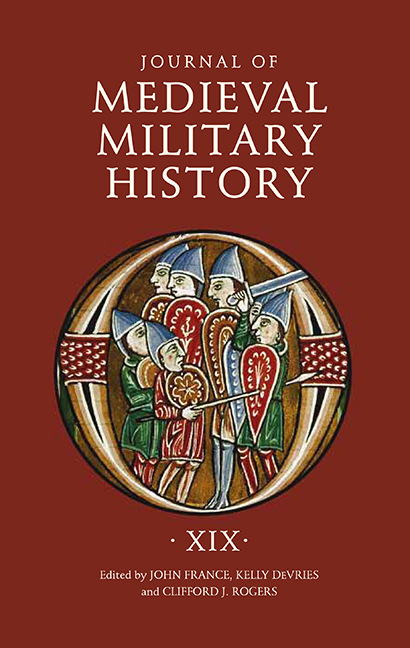Book contents
- Frontmatter
- Contents
- List of Illustrations
- 1 The Battle of Firāḍ: The Day on Which Khālid b. al-Walīd Did [Not] Defeat Both Byzantines and Persians
- 2 A Mislocated Battlefield? Battle Flats: The Battle of Stamford Bridge, 1066
- 3 The Frankish Campaign of 1133–1134 in Northern Syria and the Battle of Qinnasrīn
- 4 Bella Plus Quam Civilia? The Place of Battle in the Context of Civil War under the Anglo-Norman and Angevin Kings, c. 1100–c. 1217
- 5 Edward I’s War on the Continent, 1297–1298: A New Appraisal
- 6 The Earliest European Recipes for “Powder for Guns” (1336 and 1338–c. 1350)
- 7 Bellicose Rhetoric: The Memorable War Speeches of One Aragonese Royal Couple
- 8 Coureurs and Their Role in Late Medieval Warfare
- List of Contributors
- Journal of Medieval Military History 1477–545X
7 - Bellicose Rhetoric: The Memorable War Speeches of One Aragonese Royal Couple
Published online by Cambridge University Press: 02 June 2021
- Frontmatter
- Contents
- List of Illustrations
- 1 The Battle of Firāḍ: The Day on Which Khālid b. al-Walīd Did [Not] Defeat Both Byzantines and Persians
- 2 A Mislocated Battlefield? Battle Flats: The Battle of Stamford Bridge, 1066
- 3 The Frankish Campaign of 1133–1134 in Northern Syria and the Battle of Qinnasrīn
- 4 Bella Plus Quam Civilia? The Place of Battle in the Context of Civil War under the Anglo-Norman and Angevin Kings, c. 1100–c. 1217
- 5 Edward I’s War on the Continent, 1297–1298: A New Appraisal
- 6 The Earliest European Recipes for “Powder for Guns” (1336 and 1338–c. 1350)
- 7 Bellicose Rhetoric: The Memorable War Speeches of One Aragonese Royal Couple
- 8 Coureurs and Their Role in Late Medieval Warfare
- List of Contributors
- Journal of Medieval Military History 1477–545X
Summary
This article deals with the well-known subject of war rhetoric and the not-so-well-known military history of the fourteenth-century Crown of Aragon. It focuses specifically on the important Aragonese king, Pere III (r. 1336–1387) during the ten-year conflict with Castile in the so-called War of the Two Pedros (1356–1366) and the crucial role his third wife, Elionor of Sicily (r. 1349–1375) during the stormy corts of Barcelona in 1364–1365. In both cases the royal couple delivered emotional and hard-hitting rhetoric which either readied soldiers for battle or convinced the Catalan parliamentary estates to vote funds to continue the war with Castile. English translations of the speeches in questions are provided in separate appendices.
As the thirteenth century faded in the Iberian Peninsula, the Castilian king, Sancho IV (r. 1312–1350), wrote a royal guidebook for his son, the future Fernando IV (r.1312–1350). In it, he discussed the elements that made a sovereign powerful. Of all these, he concluded that a ruler's word was the most powerful weapon he could wield. The careless use of this powerful tool could do more to weaken a king's position of power than a well-armed and -trained army could in attempting to overthrow him.
This focus on the importance of the spoken word had a long history in Greek and Roman war-making and throughout the Middle Ages.
Such discussions that manifested themselves during the Middle Ages viewed the waging of war as either a positive or negative aspect of human life. The great majority of these texts considered warfare an important experience of human existence. Some authors, warriors themselves, such as Bertran de Born (c. 1158–1215), portrayed their colorful memories of the battlefield, complete with the snorting of charging horses, the clang of sword upon sword, and the great spilling of human blood. This heroic reflection of combat was occasionally met with an opposite position that saw and condemned warfare's violent side as a danger to human society. An example of such condemnation is apparent in an Arabic magic text translated into Latin at the court of Alfonso X of Castile (r. 1252–1284) with the title, Picatrix. This treatise looked on human conflict as a doleful source of “deaths and damage…battles, terrors, discord… anxiety and misery.”
- Type
- Chapter
- Information
- Journal of Medieval Military HistoryVolume XIX, pp. 127 - 146Publisher: Boydell & BrewerPrint publication year: 2021

